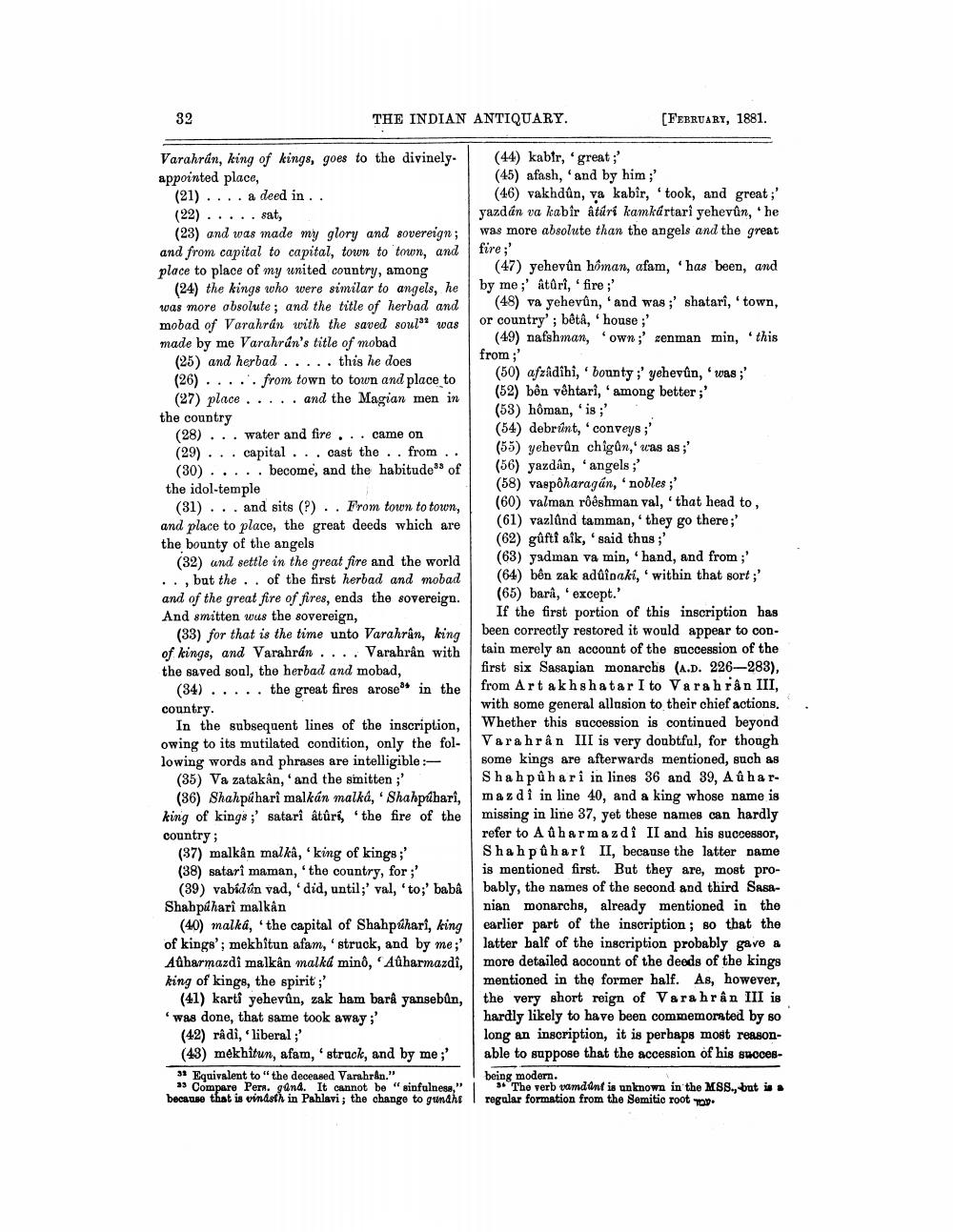________________
32
THE INDIAN ANTIQUARY.
[FEBRUARY, 1881.
Varahrun, king of kings, goes to the divinelyappointed place,
(21) .... a deed in .. (22) . . . . . sat,
(23) and was made my glory and sovereign; and from capital to capital, town to town, and place to place of my united country, among
(24) the kings who were similar to angels, he was more absolute; and the title of herbad and mobad of Varahrán with the saved souls was made by me Varahrán's title of mobad
(25) and herbad ..... this he does (26) .... from town to town and place to
(27) place ..... and the Magian men in the country
(28) ... water and fire ... came on (29) ... capital ... cast the .. from ..
(30) . . . . . become, and the habitudes of the idol-temple
(31) ... and sits (?) . . From town to town, and place to place, the great deeds which are the bounty of the angels
(32) and settle in the great fire and the world .., but the .. of the first herbad and mobad and of the great fire of fires, ends the sovereign. And smitten wus the sovereign,
(33) for that is the time unto Varahrán, king of kings, and Varahrán . . . . Varahrân with the saved soul, the herbad and mobad,
(34) ..... the great fires arose in the country.
In the subsequent lines of the inscription, owing to its mutilated condition, only the following words and phrases are intelligible :
(35) Va zatakan, and the smitten;"
(36) Shahpühari malkán malka, Shahpúbari, king of kings;' satari âtûri, the fire of the country;
(37) malkân mal kâ, 'king of kings; (38) satari maman, the country, for;
(39) vabídún vad, 'did, until;' val, 'to;' babâ Shahpuhari malkan
(40) malka, the capital of Shahpúhari, king of kings'; mekhitun afam, 'struck, and by me;' Allharmazdi malkan malká mino, Allharmazdi, king of kings, the spirit;'
(41) karti yehevùn, zak ham barê yansebun, was done, that same took away;' (42) rádi, liberal;' (43) mekhitun, afam, strack, and by me;" 31 Equivalent to the deceased Varahran."
» Compare Pern. gang. It cannot be "sinfulness," because that is vindoth in Pahlavi; the change to gunahe
(44) kabir, great;' (45) afash, and by him ;'
(46) vakhdûn, va kabir, took, and great;' yazdán va kabir âtúri kamkártari yehevůn, he was more absolute than the angels and the great fire;'
(47) yehevûn hôman, afam,'has been, and by me;' âtûri, fire ;'
(48) va yehevůn, and was ;' shatarî,' town, or country'; bêtâ, house;'
(49) nafshman, own;' zenman min, this from ;
(50) afzâdihi, 'bounty :' yehevûn,' was ;' (52) bên vehtari, among better; (53) hôman, 'is ;' (54) debrúnt, conveys;' (55) yehevận chigün,' was as;' (56) yazdân, angels ;' (58) vaspoharagán, 'nobles ;' (60) valman rôêshman val, that head to, (61) vazlûnd tamman, they go there;' (62) güfti aik, said thus;' (63) yadman va min,'hand, and from ;' (64) bên zak addioaki, within that sort;' (65) barà, except.'
If the first portion of this inscription has been correctly restored it would appear to contain merely an account of the succession of the first six Sasapian monarchs (1.D. 226-283), from Art akhshatar I to Varah rån III, with some general allusion to their chief actions, Whether this sucoession is continued beyond Varah rân III is very doubtful, for though some kings are afterwards mentioned, such as Shah pû hari in lines 36 and 39, A û har. mazdi in line 40, and a king whose name is missing in line 37, yet these names can hardly refer to A a harmazdi II and his successor, Shah pll harf II, because the latter Dame is mentioned first. But they are, most probably, the names of the second and third Sasanian monarchs, already mentioned in the earlier part of the inscription; so that the latter balf of the inscription probably gave a more detailed account of the deeds of the kings mentioned in the former half. As, however, the very short reign of Varahran III is hardly likely to have been commemorated by so long an inscription, it is perhaps most reasonable to suppose that the accession of his succesbeing modern.
The verb vandant is unknown in the M88., but is regular formation from the Semitio root Top




